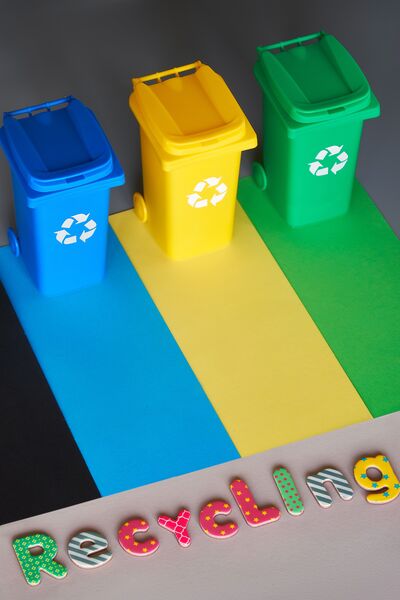Interview with Tom Eng : "Recycling technology is constantly evolving"

What are the challenges of recycling aluminum?
First of all, it's to collect and sort aluminum. There are not a lot of countries that are looking at increasing the secondary sorting and industrial secondary production of aluminum. That's the first challenge. The second challenge is on the technical side. We already are able to do a lot of things like sort magnesium from aluminum and so on. I think the biggest challenge still is how to look different at alloys. For example, the car industry has different alloys for different parts of the car, the door or the engine, or some other part. That is where you need to look at new technologies.
Technology is constantly evolving. We are working on one called LIBS, laser-induced breakdown spectroscopy. It’s a technology to look at the elemental composition of the material. (Editor’s note: LIBS is a method of chemical analysis, a type of the so-called atomic emission spectroscopy using a highly energetic laser pulse as the excitation source.)
I can't talk much about it. It's still early days. We have a prototype out in the market and the customers are happy with the purity, they're happy with the hit rate, and they're happy with the tonnage. Our philosophy is that when we bring out technology, it needs to have high tonnage. A kind of laboratory solution is not good enough. It needs to operate in a production environment. The one thing that is still a challenge is the availability. But I think we have come quite far in terms of recycling aluminum. Also, all of the aluminum is on a high level compared to many other material strips.
So which metal poses the biggest challenge for recyclers?
Maybe some of the steel fractions. Composites are also extremely hard to recycle. If you look at the new windmills, there you see more of a kind of chemical recycling as you do with plastics. We haven't seen that coming to a good solution so far on the composites. So, they are probably the trickiest ones. But I'm sure, at least for us, once we see that the demand is there and there is an interesting market, then we will also throw resources at that. But we haven't done that yet.
If you want to know more about the possibilities of steel recycling, read our articles here and here.
You mentioned chemical recycling. Do you see a future for that as well, for different materials?
I think if we want to reach those targets that, for example, were set here in the EU on recycling, there is no way around chemical recycling. But it's in addition to mechanical recycling, and it shouldn't be instead of it. We need to be very careful that the different actors don't run for the same material.
For certain fractions, it's proven that mechanical recycling works. I think we should continue with that. And then there are other fractions where it's difficult to do the mechanical recycling, but we know that chemical recycling is working. At a higher cost because of the higher energy demand and because it's more complicated. But of course, you get the virgin-like quality out of it and you don't lose materials. So, I think you need to make sure that the players out in the market agree: We will take care of that. You take care of that and let's not start fighting about the same material. Of course, there will always be some gray areas, but we should try to make that gray as small as possible.
Interested in chemical recycling? Read our articles here, here and here!
Is there a way of not only collaboration but also coordination within the industry to share ideas?
I would for sure wish for it, and I think it also makes sense. We see some tendencies that waste management companies are talking with the chemical companies and with companies like us, who are more on the supplier side. That has definitely changed over the last three or four years. Previously it was a little bit black and white. The brands didn't care to talk with us because they didn't see the use of it. Now they understand that we need to look at the whole value chain from production to recycling and everything in between. But it's still kind of an issue of one association. But there are much more talks than just at an exhibition like IFAT in Munich. We are meeting a lot of these companies and we try to also make waste management companies, recyclers, and brands start talking with each other. I think there are business opportunities for many and will continue to be.
Do you also see a shift within the population in the perception of the waste industry?
Absolutely. I've been in the industry for 24 years. If I met somebody 24 years ago and I said "I'm working for recycling and doing this and that", people said, "Okay, yes. So did you watch the football game yesterday?" And now people are saying, "Oh, really interesting. Tell me about it."
I think this has a lot to do with the plastic issue and the whales with the plastic in their stomach and everything else. It's much higher on the agenda for everybody, at least in our part of the world. But if we look to, for example, in Asia, where a lot of the plastic pollution is coming from, many people have one main goal when they wake up in the morning and that's to get food on the table. They don't care about recycling and we wouldn't either. That's just the situation we are in.
Some people of course make a living from collecting waste. I think there is a link between those scavengers, as they are called, and telling them that they can earn a living and do something good.
Companies in the industry now understand that it is necessary to look at the whole value chain from production to recycling and everything in between.Tom Eng, SVP and Head of TOMRA Recycling
Coming back to recycling itself: How important is source separation right now?
I think it's important for certain fractions. You need to take out the organic waste because that's just disturbing the other fractions and of course hazardous and electronic waste. You could discuss if you take paper and cardboard out separately because in some cases it can be disturbed by the organic. But for all the rest we have shown that it's possible to extract high-quality virgin-like material. You might ask, why don't we do that in Germany, or France, or elsewhere? Well, I think that's a little bit different because you already have a system in place. There is an infrastructure that has cost a lot of money. Over the years, you have educated the population. If you now say, we're going to change everything, that, at least for a transition period, will probably do more bad than good. But in countries where they don't have a system - which is still a big portion of the globe - there I think it definitely makes sense to look at technical solutions.
But even in countries with source separation systems in place for a long time, people get confused about where to put what. How can people be educated?
I guess the key is to keep it simple. And maybe you also need to have some kind of incentive system. That might be able to improve the source separation.
Is there enough of a market for secondary raw materials or do producers prefer virgin materials?
When you look at some of the material prices, some secondary raw materials are even more expensive than virgin materials. That also shows that there is a willingness in the market to pay for that material. Maybe it is greenwashing to a certain extent, but they also can show that they are using recycled content in their product which is important for more and more consumers.
Some countries already have taxes. If you don't have 30% recycled content, you need to pay taxes. So, there are some incentives there also on the financial side to make sure that you get recycled content. In my opinion, this will develop not only for PET but also for other types of plastics and different types of metals. There are also individual pledges from companies.
This is going to be a trend that only just started. And it's up to us to make sure that we can prove that the technology works. It's more than just our technology, of course, but at least we will do our part.

As you said, there are incentives in certain states. There are also legal requirements like the European green deal or the National Recycling Strategy in the US. How important do you think are these to increase recycling rates?
Fundamental. I think you need the legislation in place. The Americans would probably argue a bit more against that than the Europeans. But I think you need some kind of legislation to make sure that the companies start also looking at alternatives.
Although balance is key, over-legislation is also not good. It’s also about having an even playing field between what the European producers are faced with and say the North American or the Asian market, where they don't have that legislation. But I think it’s possible to solve those issues with some regulations and agreements.
There is also a lot of waste trade, mainly from countries with strict legislation in place to those with less rigid regulations. Would it be necessary to stop that?
I think stopping trade is not a good solution. It’s good that regulations such as the new Basel convention put limitations on exports and imports. But I'm all for free trade and movement. It's more about having framework conditions and working with them. In my opinion, it's a little bit naive to think that we can do everything ourselves here in Europe. We can do more and we can put some framework conditions in place, but we cannot stop the waste trade.


